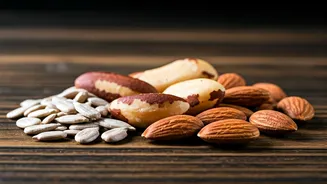The Greying Process
Premature greying is a significant concern for many. It's often associated with aging, but it can also be influenced by a variety of factors, including
genetics, stress, and nutritional deficiencies. The process occurs when the pigment-producing cells in hair follicles, known as melanocytes, gradually decrease or stop producing melanin. Melanin is the substance responsible for hair color. When melanin production declines, hair loses its color and turns grey or white. Understanding this process is the first step towards managing and potentially slowing it down. Identifying the underlying causes and adopting preventative measures, such as a balanced diet, can help preserve hair color for longer.
Vitamin B12's Role
Vitamin B12 is essential for various bodily functions, including maintaining healthy hair. A deficiency in vitamin B12 can contribute to premature greying. This vitamin plays a crucial role in the production of red blood cells, which carry oxygen to the hair follicles. Sufficient oxygen supply is vital for hair health and pigment production. Furthermore, B12 aids in DNA synthesis, which is necessary for cell division and hair growth. Foods rich in vitamin B12 include meat, fish, eggs, and dairy products. If dietary intake is insufficient, supplementation may be considered, but it's important to consult with a healthcare professional to determine the appropriate dosage.
Iron's Significance
Iron is another key nutrient that influences hair health and pigment production. Iron deficiency, or anemia, is a common issue that can lead to premature greying. Iron helps carry oxygen to the hair follicles, supporting their function and melanin production. Low iron levels can disrupt this process, potentially leading to hair discoloration. Incorporating iron-rich foods into your diet is essential. Good sources of iron include red meat, spinach, lentils, and fortified cereals. It's also important to consume vitamin C with iron-rich foods, as it enhances iron absorption. Supplementation may be necessary for those with iron deficiencies, but always consult a doctor before starting any supplements.
Copper for Melanin
Copper is an essential mineral that plays a crucial role in melanin production. Melanin is the pigment that gives hair its color. Copper acts as a cofactor for enzymes involved in melanin synthesis. A copper deficiency can hinder melanin production, potentially leading to premature greying. Eating foods rich in copper, such as nuts, seeds, and organ meats, can help maintain adequate copper levels. While copper deficiency is relatively rare, ensuring sufficient intake through a balanced diet is advisable. If you have any concerns about copper levels, it's best to consult a healthcare professional for guidance and to consider potential supplementation, if needed.
Vitamin D's Influence
Vitamin D is essential for overall health, including hair health. While not directly involved in pigment production, vitamin D deficiency has been linked to various hair problems, including premature greying. Vitamin D aids in the absorption of calcium, which is important for hair follicle health. It also possesses anti-inflammatory properties, which can help create a healthy scalp environment. Getting enough sunlight is a good way to boost vitamin D levels, as your body naturally produces it when exposed to sunlight. You can also get vitamin D from foods like fatty fish and fortified foods. Supplementation is an option, especially for those with limited sun exposure or specific health concerns, but a doctor's advice is crucial.













